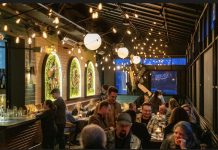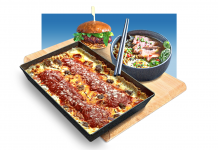
Wharton, Sloan, Stanford, Haas. These are just a few of the business school alma maters among founders of the more reputable food delivery services trending across the globe — we’re talking companies such as DoorDash and Grubhub. David Cabello, founder of Black and Mobile, a food delivery service for black-owned restaurants, discovered his mission to support the African American community as an undergrad at Grove College of Business, a lesser-known program at Shippensburg University in Pennsylvania. Cabello quickly decided he didn’t need a college degree to pursue his mission and, as a sophomore, he dropped out. Instead, Cabello chose to draw from the education he earned on the job as a service worker for various food delivery companies — Uber Eats, Postmates, and Caviar to name a few. “After dropping out of college, I had made $1,100 delivering food on a bike in about 30 hours,” says Cabello, now 24. “I thought, ‘If I can make this much money delivering food on a bike, how much could I make if I owned the company?’ ” Cabello launched Black and Mobile in his hometown of Philadelphia in 2016 and earlier this year, along with his mother and twin brother who run the company with him, successfully launched its first expansion in Detroit. Today, 20 local black-owned Detroit restaurants are on Black and Mobile and Cabello expects continued growth in the months ahead.
Hour Detroit: What was your inspiration for launching Black and Mobile?
David Cabello: I went to college for business. Me and my twin brother were roommates at Shippensburg University, and our third semester we dropped out. The day after Trump got elected, we said we were going to help black businesses any way we could. After that, I started delivering on Uber Eats, Postmates, and Caviar. After dropping out of college, I had made $1,100 delivering food on a bike in about 30 hours. I thought, “If I can make this much money delivering food on a bike, how much could I make if I owned the company?” So, I went home and typed into YouTube, “How to start a delivery service.” Come to find out, there were no other black-owned delivery services. I was excited! I already knew I was going to help our people, black people, but I didn’t know how. Once I realized this could be my business, I started learning more about the numbers. I said I was going to be the first and that’s exactly what I did — Black and Mobile is the first black-owned food delivery service to deliver exclusively for black businesses. There are other small, black-owned delivery services in almost every city, but we’re the only one that does it strictly for black-owned businesses. We expanded very quickly, so we’re also the largest in the country — that I know of.
What was the connection to the presidential election in 2016 that led to your mission to support black businesses?
I just thought, “Well, this is going to wake black people up.” I knew this country wasn’t for us regardless of who was in office, so I said I was going to have to help our people myself. I came up with the idea of Black and Mobile in 2017 and we launched during Black History Month in 2019.
Were there any challenges along the way?
The first year, we didn’t really do that much. Between February and July, we sold about $7,000 worth of food and then we had to close because I got hit by a car. I could have opened two weeks later, but I took time to raise money and re-launch. We launched a Kickstarter, designed a new website, got a new app on iOS and Android, and then I launched Oct. 1 — from October to December, we sold about $20,000 worth of food versus $5,000 in that first five months. This year, we’re on pace to do probably about $400,000-$600,000.
Why expand to Detroit?
Detroit was my first expansion for two reasons — one business and one personal. On the business side of it, I had someone out there who I met in Philly who said, “I’m bringing this to Detroit.” Everyone says they like the idea, but he stayed consistent. Eventually, I thought, Detroit’s got a lot of black business, let’s go for it. Adrian, I call him Ace, is still helping me. He gets the drivers ready and helps me get business signed up, but as far as the system-running, we do all that from Philly. We handle dispatching, calling the restaurant and making sure the order’s placed, etc. On a personal level, I wanted to follow the footsteps of the honorable Elijah Muhammad. That’s my great grandmother’s first cousin so I wanted to follow his footsteps. He left Sandersville, Georgia — where my family still stays — and went all the way to Detroit, so that’s the first place I want to go to.
Very cool. What are some of the most popular business you work within Detroit?
We’ve got Kuzzo’s Chicken & Waffles, Conant Street Grill, 4 Of a Kind Cuisine, The Jamaican Pot is popular, and I can’t forget about Hashbrowns Cafe and Southern Comfort & More. That’s just some of them. We have about 20 in Detroit and 50 in Philly.
How has the COVID-19 crisis shifted business for you in Detroit?
We’ve never seen numbers like this. What we used to do in five months, we’re doing that in two days. We sold as much food in two weeks as we did all of 2019. So, we’re killing it right now. But there are pros and cons. The pro is that we’re getting a lot of orders so I’m able to hire people. The bad side is, some people don’t feel comfortable coming outside so I’ve lost some drivers. And more than half of the more popular restaurants in Detroit closed for about three weeks, which was a hit on my sales. They’re now starting to re-open. But we’ve done pretty well so I can’t complain.
How has it impacted further expansion?
We put a pause on our expansion to Atlanta because the city started introducing curfews and things. We’ve postponed to July — we may even do June — but I just wanted to give it a little bit more time for everything to clear. Chicago will be next but we’re going to hold on expanding like crazy until we get our new app system, which should be done by around October. It’ll be very similar to Uber Eats, so our sales are going to triple. The plan is then to expand to a new city every month.
Do you only employ black workers?
Not at all. We’re not segregating completely. We’re just trying to help our people, as far as restaurants, economically. But anyone can order, and anyone can work for us. If a white person, an Asian person, an Indian person — whoever — if they want to work for me or they want to order, they can do that. We’re servicing the community and we’re servicing black businesses.
|
|
|












